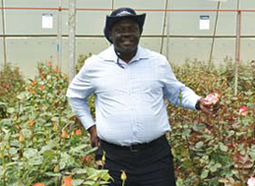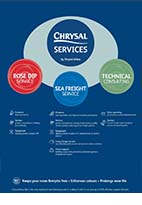 UPL Ltd has continued to deliver successful product innovations. This time they organised a very successful virtual training on Vacciplant, an innovative Biofungicide against powdery mildew in Ornamental crops and Snowpeas. Timely and almost audio-recorded voice of Lara Ramaekers, a UPL Biosolutions Specialist, greeted the air as she took growers through the innovation.
UPL Ltd has continued to deliver successful product innovations. This time they organised a very successful virtual training on Vacciplant, an innovative Biofungicide against powdery mildew in Ornamental crops and Snowpeas. Timely and almost audio-recorded voice of Lara Ramaekers, a UPL Biosolutions Specialist, greeted the air as she took growers through the innovation.
Speaking to the growers Lara asked, “Have you ever thought of protection against powdery mildew without residue?” Adding, “We are discussing the newest technologies in protection against powdery mildew and other causal pathogens. It allows the grower to reduce the number of active ingredients used, achieve better.
Key Benefits
Through the Vaccine action, Vacciplant prompts the plant to fight against the diseases. The product is better used preventively. Lara told the growers that the product has control of various fungal and bacterial diseases with zero residue (0 days PHI). The product poses minimal risk of development of resistance. She confirmed that the product is compatible with both conventional and other biological products. It has no harm to any beneficial organisms and has a unique mode of action. (FRAC Group P4). The product has been approved for organic farming by Ecocert. Vacciplant is also a great tool for successful Integrated Pest Management programs. It is one of the best alternatives for the most demanding food chains and organic growers. It is a complimentary solution to conventional plant protection products.
Use of Vacciplant Growers were advised to use Vacciplant before appearance of disease symptoms. It can be used to reduce the number of conventional fungicides when disease pressure is low to medium. Growers can break resistance to chemical fungicides by using Vacciplant in a program. In case of high disease pressure, growers are advised to tank-mix with conventional fungicides to boost disease control or do a clean-up first with the highly curative fungicides.
Vacciplant
Speaking to the growers, Estelle Moreau, UPL Global Technical Lead Biofungicides said, “Vacciplant is a bio-fungicide containing Laminarin as the active ingredient which controls Powdery Mildew on Roses and Snow peas. Laminarin is a natural ingredient extracted from Laminaria digitata a seaweed very concentrated in this molecule”.
Mode of Action
As an eye opener to the new molecule, Estelle said, “all living organisms, plants have evolved a wide range of mechanisms to defend themselves against diseases and pests. Systemic Acquired Resistance (SAR) is a form of induced resistance that is activated throughout a plant after being exposed to elicitors from virulent, avirulent, non-pathogenic microbes or artificial chemical stimuli. Induction of SAR is characterised by the accumulation of salicylic acid to stimulate defence mechanism. It can take several days for SAR to develop throughout the host plant. Laminarin triggers plant defense response in three main ways namely;
- Reinforcement of the cell walls
- Production of phytoalexins
- Production of PR proteins.
Resistance and Residue Management Estelle presented numerous trials of Vacciplant in comparison to other products in use. She said, “Laminarin acts on various pathways through the plant and not directly on the pathogen, it doesn’t add selective pressure on the pathogen strains and probability of resistance appearing is greatly reduced. Consequently, there is a very low risk that using Laminarin selects pathogen strains resistant to the plant defense mechanisms”.
She informed growers that including Vacciplant in their programs reduces the active ingredients from chemical fungicides and maintains the yield compared to full conventional fungicide programs.
 Field Trials
Field Trials
Ms. Hannah Kibiru, Product Development Specialist, Arysta LifeScience Ltd, shared results from trials conducted in Kenya on over 60 rose varieties and other ornamental varieties in collaboration with more than 50 growers across the different flower growing regions. Vacciplant proved to be effective against Powdery mildew on Ornamental Plants especially when applied as a preventative for three consecutive applications at 7-10 days interval. Vacciplant is safe to a wide range of beneficial insects and predatory mites.
Grower’s Testimony
Vacciplant launched in Kenya in 2019 has been used by numerous farmers. Mr. Fred Okinda of Deruiters explained to fellow growers why they should have Vacciplant in their spray programs.
“Vacciplant works as an elicitor, it triggers a plants own natural defence against harmful pathogens, with a long elicitation ability of upto 21 days in a plant”, he said.
1. It is a good system in the attempt to reduce agrobacteria infections which is a major problem in the rose industry.
2. Breaks down resistance to major fungicides. Fits in fungicide resistance management
3. Reduces number of active ingredients per season due to its long persistence
4. Does not have residue and has a short re –entry interval that allows crop husbandry practices to be done in a timely fashion. Compatible with IPM unlike Sulphur that is not friendly to some beneficials.
5. Being a seaweed, it is friendly to the environment, and also the health and safety of sprayers is guaranteed.
6. Eliminates the blackening and thinking about chemical residues on the product.
7. It has suppressive effect on downy mildew and botrytis.
 Growers’ Comments Other growers who spoke during the virtual meeting took the opportunity to congratulate UPL on this important milestone of providing an innovative solution against powdery mildew in ornamentals that will significantly improve both quality and quantity of production. They thanked UPL for closely collaborating with various stakeholders in the flower industry to bring to market solutions that meet the needs of growers and the European export markets.
Growers’ Comments Other growers who spoke during the virtual meeting took the opportunity to congratulate UPL on this important milestone of providing an innovative solution against powdery mildew in ornamentals that will significantly improve both quality and quantity of production. They thanked UPL for closely collaborating with various stakeholders in the flower industry to bring to market solutions that meet the needs of growers and the European export markets.
Global usages of Vacciplant
Across the globe, Vacciplant was reported to control a wide spectrum on fungal and bacterial diseases including;
1. Powdery mildew on vines, vegetables and berries.
2. Botrytis on vegetables and berries
3. Bacterial diseases on several crops
4. Downy mildew on lettuce and cucurbits. There is ongoing research to further identify the potential of Vacciplant. Trials are also ongoing in Kenya and the label will be extended once registration is acquired.
Attendance
The successful zoom was well co-ordinated by Mr. Innocent Arunda. He was backed by other technical, sales and management team from UPL. In attendance were over 80 growers from all over the country and the neighbouring Ethiopia. Representatives from their key distributors also attended.


